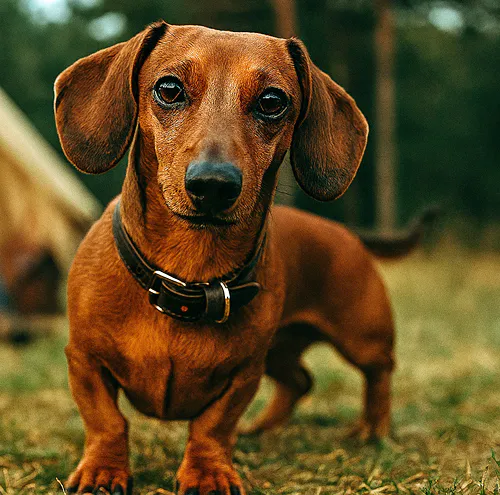
The Miniature Dachshund is a small dog with a long body, short legs and a big personality that often surprises those who meet it for the first time. Known affectionately as the sausage dog, it is a breed that combines charm, intelligence and a strong sense of loyalty. While its size makes it easy to carry and house, its history reveals a working dog with a determined nature.
The breed’s roots lie in Germany, where Dachshunds were developed during the medieval period to hunt badgers. The name itself is German, and means “badger dog”. Early Dachshunds were larger than the ones we know today, bred to dig into badgers setts and flush out the fierce animals. Their long, low bodies allowed them to manoeuvre underground, while their strong front legs and large paws made them efficient diggers. Over time, hunters began to breed smaller Dachshunds to pursue rabbits and other small game. By the late nineteenth century, the Miniature Dachshund had emerged as a distinct type, retaining the same proportions as the standard but in a more compact frame.
The breed’s popularity spread beyond Germany in the late 1800s, particularly to Britain, where it was valued both as a hunting companion and a household pet. In the early twentieth century, political tensions during the First World War caused a decline in numbers outside Germany, but dedicated breeders worked to preserve and revive the breed. By the mid-1900s, the Miniature Dachshund had regained its place as a much-loved companion, and today it is one of the most recognisable small breeds in the world.
A Miniature Dachshund typically stands between 13 and 18 centimetres at the shoulder and weighs no more than five kilograms. It comes in three coat varieties: smooth, longhaired and wirehaired. Smooth-coated dogs have sleek, shiny fur that lies close to the body. Longhaired Dachshunds have a soft, flowing coat with feathering on the ears, chest and tail. Wirehaired Dachshunds have a dense, rough coat with bushy eyebrows and a beard, giving them a distinctive expression. Colours range from solid red to black and tan, chocolate and cream, and dapple patterns.
Despite their small size, Miniature Dachshunds are bold and confident. They are intelligent and quick to learn, though their independent streak can make training a test of patience. They are affectionate with their families and often form a particularly strong bond with one person. Their alert nature makes them good watchdogs, and they will not hesitate to announce the arrival of visitors. With children, they can be playful and gentle, especially if raised together, but care should be taken to avoid rough handling due to their delicate backs.
Maintenance needs vary slightly depending on coat type. Smooth-coated Dachshunds require little more than a weekly brush to remove loose hair. Longhaired dogs need more frequent grooming to prevent tangles, while wirehaired coats benefit from occasional hand-stripping or trimming. All varieties need regular nail trimming, ear cleaning and dental care. Exercise requirements are moderate. A daily walk and some playtime will keep them fit and mentally stimulated, but they should not be over-exercised while young to protect their developing spines.
Health is an important consideration for this breed. Their long backs make them prone to intervertebral disc disease, which can cause pain and mobility issues. Preventing them from jumping off furniture or running up and down stairs reduces the risk. Obesity is another concern, as extra weight puts strain on their spine and joints. Other potential issues include patellar luxation, progressive retinal atrophy and certain heart conditions. Responsible breeders screen for these problems, and owners can help by keeping their dogs at a healthy weight and providing appropriate exercise.
The Miniature Dachshund’s popularity remains strong in both the UK and the US. In Britain, it is regularly among the top ten most registered breeds with The Kennel Club. In the United States, it consistently ranks within the top fifteen according to the American Kennel Club. Its appeal lies in its adaptability, distinctive appearance and engaging personality. It suits a variety of homes, from city flats to country houses, as long as it has companionship and stimulation.
Owning a Miniature Dachshund means embracing a dog that is small in stature but big in character. It will reward its owner with loyalty, affection and a touch of mischief. With the right care and understanding of its needs, it can be a delightful companion for many years, bringing warmth and personality to any household.
